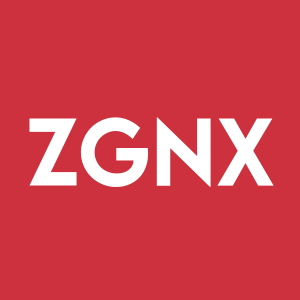Zogenix Supports New No-Cost Genetic Testing Program with United Mitochondrial Disease Foundation to Improve Diagnosis of Mitochondrial Diseases
Rhea-AI Summary
Zogenix (NASDAQ: ZGNX) has launched a no-cost genetic testing program in collaboration with the United Mitochondrial Disease Foundation (UMDF) and Probably Genetic. This initiative aims to assist patients suspected of having mitochondrial diseases, particularly TK2 deficiency. The program allows eligible U.S. patients to access genetic testing and counseling at no cost, expediting diagnosis and treatment pathways. TK2 deficiency is a severe condition resulting in muscle weakness, and Zogenix is also developing an investigational therapy, MT1621, for this rare disease.
Positive
- Launch of no-cost genetic testing program for mitochondrial diseases.
- Partnership with UMDF and Probably Genetic enhances patient access to testing.
- Potential for earlier diagnosis may improve treatment outcomes.
- Ongoing development of MT1621 for TK2 deficiency signifies commitment to rare diseases.
Negative
- No approved therapies currently available for TK2d, indicating limited treatment options.
News Market Reaction 1 Alert
On the day this news was published, ZGNX gained 0.38%, reflecting a mild positive market reaction.
Data tracked by StockTitan Argus on the day of publication.
- Symptoms of mitochondrial diseases, such as Thymidine Kinase 2 deficiency (TK2d), can vary widely and mimic other rare and common diseases, making diagnosis challenging 1,2,3
- Genetic testing offers a quicker, confirmatory path to diagnosis, enabling more accurate care and participation in available clinical trials 1,2,3
- An estimated 1 in 5,000 individuals has a genetic mitochondrial disease 4
EMERYVILLE, Calif., Feb. 15, 2022 (GLOBE NEWSWIRE) -- Zogenix (NASDAQ: ZGNX), a global biopharmaceutical company developing rare disease therapies, today announced that the company is sponsoring a new no-cost genetic testing program, the United Mitochondrial Disease Foundation (UMDF) Pilot Genetic Testing Project, in partnership with UMDF and Probably Genetic, to help patients obtain a confirmed genetic diagnosis of mitochondrial disease. The program is available to any eligible patient in the U.S. with a suspected diagnosis of mitochondrial disease. Mitochondrial diseases are a group of rare, debilitating conditions that can severely impact daily living and quality of life, and are often fatal.5,6
“Because mitochondrial diseases affect various organs and tissues, the path to diagnosis can be challenging and long,” said Bradley S. Galer, M.D., Executive Vice President and Chief Medical Officer, Zogenix. “We are proud to offer no-cost genetic testing to help expand access to these much-needed genetic tests to shorten the diagnostic journey and help patients and their families seek appropriate care.”
The UMDF Pilot Genetic Testing Project will be a patient-initiated no-cost genetic testing program for patients with a suspected mitochondrial disorder. Patients simply fill out an online symptom questionnaire and, if qualified, are mailed the testing kit. The saliva-based test is performed at home by the patient. Genetic counseling is also available to patients and their families and caregivers once test results are known.
“It’s critically important that both physicians and patients/caregivers understand the value of genetic testing, as often both are hesitant due to lack of information, awareness and/or cost,” said Philip Yeske, Science and Alliance Officer, UMDF. “We’re honored to partner with Zogenix on this novel approach to potentially enable earlier diagnosis of mitochondrial diseases to help better support patients and caregivers who are desperately seeking answers.”
The UMDF program will include testing for the TK2 gene.TK2d is a debilitating and life-threatening genetic disorder that causes progressive and severe muscle weakness. Genetic testing is the quick and direct pathway to confirm a diagnosis of TK2d. Zogenix is currently studying MT1621, a late-stage investigational nucleoside therapy for the treatment of TK2d.
Zogenix also recently partnered with Invitae to support its no-cost genetic testing program, called Detect Muscular Dystrophy, and continues to support a TK2d-specific genetic testing program through PreventionGenetics.
For more information on the no-cost genetic testing programs, please visit https://www.maybemito.com/.
About TK2d
Thymidine kinase 2 deficiency (TK2d) is a rare genetic disorder and results in mitochondrial dysfunction, leading to inadequate energy production in cells. The disease presents as progressive and severe muscle weakness that profoundly impairs movement, breathing, eating, and other normal functions. TK2d can impact people of all ages, and is often fatal, especially in those with disease onset as infants and children. There are currently no approved therapies for this disease. To learn more, please visit www.tk2d.com.
About Zogenix
Zogenix is a global biopharmaceutical company committed to developing and commercializing therapies with the potential to transform the lives of patients and their families living with rare diseases. The company's first rare disease therapy, FINTEPLA® (fenfluramine) oral solution, has been approved by the U.S. Food and Drug Administration (FDA) and the European Medicines Agency and is under regulatory review in Japan for the treatment of seizures associated with Dravet syndrome, a rare, severe lifelong epilepsy. The U.S. FDA recently accepted for filing Zogenix's supplemental New Drug Application (sNDA) and granted Priority Review for the use of FINTEPLA for the treatment of seizures associated with an additional rare epilepsy, Lennox-Gastaut syndrome (LGS). Zogenix is also initiating a study of FINTEPLA in a genetic epilepsy called CDKL5 Deficiency Disorder (CDD) and is collaborating with Tevard Biosciences to identify and develop potential next-generation gene therapies for Dravet syndrome and other genetic epilepsies. The company has an additional late-stage development program, MT-1621, in a mitochondrial disease called TK2 deficiency.
Forward Looking Statements
Zogenix cautions you that statements included in this press release that are not a description of historical facts are forward-looking statements. Words such as “believes,” “anticipates,” “plans,” “expects,” “indicates,” “will,” “intends,” “potential,” “suggests,” “assuming,” “designed,” and similar expressions are intended to identify forward-looking statements. These statements include: the timing and ability of Zogenix to complete regulatory submission in the EU and Japan for its product candidates; the expected timing of reporting data from clinical trials; the expected timing of review of Zogenix’s regulatory submissions including the sNDA for the treatment of seizures associated with LGS; Zogenix’s commercialization plans in the U.S. and Europe; and Zogenix’s plans with respect to its development programs. These statements are based on Zogenix’s current beliefs and expectations. The inclusion of forward-looking statements should not be regarded as a representation by Zogenix that any of its plans will be achieved. Actual results may differ from those set forth in this release due to the risks and uncertainties inherent in Zogenix’s business, including, without limitation: FINTEPLA may not achieve broad market acceptance as a treatment option of seizures associated with LGS or Dravet syndrome which would limit Zogenix’s ability to general revenues; Zogenix may not be successful in executing its sales and marketing strategy for the commercialization of FINTEPLA in the U.S. and Europe, including due to the costs and procedures related to the REMS certification process or controlled access program; the structure, timing and completion of the announced merger between us and UCB S.A., and any effects of the announcement, pendency or completion of the announced merger, including the anticipated benefits therefrom; the COVID-19 pandemic may continue to disrupt Zogenix’s business operations, impairing the ability to commercialize FINTEPLA in the U.S. and Europe and Zogenix's ability to generate product revenue in the U.S. and Europe and conduct its development programs; unexpected adverse side effects or inadequate therapeutic efficacy of fenfluramine that could limit regulatory approval or commercialization, or that could result in recalls or product liability claims; later developments with FDA that may be inconsistent with the already completed meetings; additional data from Zogenix's ongoing studies may contradict or undermine the data previously reported; the potential for the FDA to delay timing of review of the sNDA due to the FDA's internal resource constraints or other reasons; and other risks described in Zogenix’s prior press releases as well as in public periodic filings with the U.S. Securities & Exchange Commission. You are cautioned not to place undue reliance on these forward-looking statements, which speak only as of the date hereof, and Zogenix undertakes no obligation to revise or update this press release to reflect events or circumstances after the date hereof. All forward-looking statements are qualified in their entirety by this cautionary statement. This caution is made under the safe harbor provisions of Section 21E of the Private Securities Litigation Reform Act of 1995.
CONTACTS:
Zogenix
corpcomms@zogenix.com
Investors
Brian Ritchie
Managing Director, LifeSci Advisors LLC
+1 (212) 915-2578 | britchie@lifesciadvisors.com
Media
Trish McCall, Porter Novelli
+1 (805) 390-3279 | trish.mccall@porternovelli.com
_____________________
1 Garone C, Taylor RW, Nascimento A, et al. Retrospective natural history of thymidine kinase 2 deficiency. J Med Genet. 2018;55(8):515-21
2 Wang J, Kim E, Dai H, et al. Clinical and molecular spectrum of thymidine kinase 2-related mtDNA maintenance defect. Mol. Genet Metab. 2018;124:124-30
3 Domínguez-González C, Hernández-Laín A, Rivas E, et al. Late-onset thymidine kinase 2 deficiency: a review of 18 cases. Orphanet J Rare Dis. 2019;14(1):100
4 Parikh S, Goldstein A, Karaa A, et al. Patient care standards for primary mitochondrial disease: a consensus statement from the Mitochondrial Medicine Society. Genet Med. 2017;19(12):10.1038/gim.2017.107
5 Cohen B, Balcells C, Hotchkiss B, Aggarwal K, Karaa A. A retrospective analysis of health care utilization for patients with mitochondrial disease in the United States: 2008-2015. Orphanet J Rare Dis. 2018;13(1):210
6 Wang J, El-Hattab AW, Wong LC. TK2-related mitochondrial DNA maintenance defect, myopathic form. In: Adam MP, Ardinger HH, Pagon RA, et al, eds. GeneReviews® [Internet]. University of Washington, Seattle; December 6, 2012. Updated July 26, 2018. Accessed July 30, 2021. https://www.ncbi.nlm.nih.gov/books/NBK114628/








